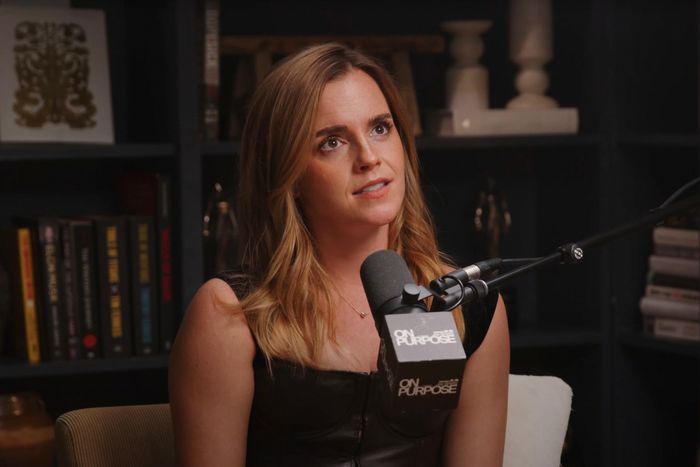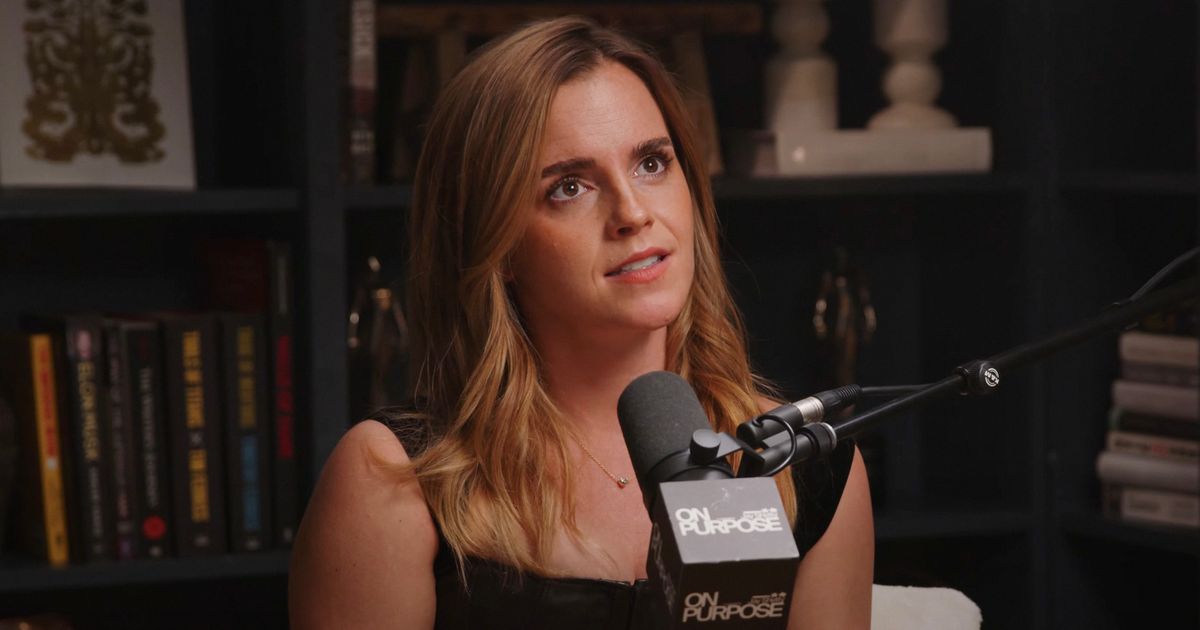
Her conversation with Jay Shetty is as long as most Harry Potter films.
Photo: Jay Shetty Podcast/YouTube
Is Emma Watson still famous? She hasn’t appeared on the big screen since Little Women in 2019, but whether or not she is a celebrity, or even an actor, has been the subject of focus ever since. Watson has nothing new coming out — she still hasn’t acted, let alone directed or written anything — but in the past week, she has had two interviews promoting, well, not doing promotional work. Her anti-press-tour press tour promotes one thing and one thing only: Emma Watson.
“I’m just showing up today for myself, and for once I’m not showing up to speak on behalf of anyone or anything else other than myself,” she tells podcast host Jay Shetty on his podcast, On Purpose. She said something to the same effect to her friend Hassan Akkad in Hollywood Authentic. “I do not miss selling things. I found that to be quite soul-destroying. But I do very much miss using my skill-set, and I very much miss the art. I just found I got to do so little of the bit that I actually enjoyed,” she explained. Neither is quite an “I’m telling MY story for once” type of interview (despite the big capital letters Shetty’s team put over the YouTube still), but rather Watson is reflecting on the past six years of her life outside the public eye. What she has been up to is realizing how much doing a press tour is the type of thing she can’t really sustain, but she only knows how to express that idea through doing a press tour.
There’s a degree of cognitive dissonance to Watson’s explanation in these conversations: She’s clearly selling something, but it’s not a film or even her artisanal gin she works with her brother on. Instead, she’s promoting a kind of self-awareness she has not often shown — she’s confessing, perhaps later than one would expect, that her life is nuts. She knows her life is nuts. And part of why she stepped away from the world of acting was to process how nuts it is to be an actor, a famous person, and a public figure. “Even being the person who was promoting the work became a kind of role. Like, ‘Emma Watson’ became this avatar, this person I identified with but also didn’t,” she confesses to Shetty.
Beyond her distaste for selling a film, part of what Watson says became her breaking point was having to do press around the personal relationships she developed while working on movies. She was spoiled, she admits, by the interpersonal dynamics on the Harry Potter films, where everyone was encouraged to think as though they were a family. While Watson doesn’t name a particular film that made her feel rejected as a person by her castmates, one could consider Little Women — her last film — the point of no return. She explains to Shetty that part of what became stressful and “bone-breakingly painful” was having to maintain an illusion of camaraderie where there was none. She explains, “You have to pretend that you’re all best friends, and I think people wish that they were. Having to pretend that something exists that you really want but don’t have is pretty grainy in the wound.” She chokes up telling this story but admits she is happy to be able to recognize that something was wrong and go forward and fix it.
So what has she been working on? She refuses to name any particular project when speaking with Akkad. (She tells him that she has “just been working really hard on “something she’s never done before.”) It’s possible that she’s referring to the writing she’s been doing in her first year of her master’s program in creative writing at Oxford: writing a play about, well, being Emma Watson. “It’s about me transitioning from being a full-time actress and activist to try to move home and be a normal student and attend a normal university as a super-famous person,” she says. Watson performed the play for her family and friends and even sends it to people she goes on dates with (or new friends) in order to make sense of her whole deal.
What becomes apparent over the course of Shetty’s podcast in particular is that Watson’s strengths are increasingly not in the film industry, where she embodies anything but herself. On the surface, complaining about the notion of a press tour feels like Champagne problems, but she has been at this since she was 9. Speaking for herself now, as an adult in her mid-30s, Watson is so much more compelling than she ever was onscreen; she’s funnier and more vulnerable than she’s ever been as a character. It’s possible that after all this time, her most fascinating contribution to the world of art is her ability to admit how impossible doing all of this is — her failures are far more interesting than her victories. This is never more apparent than when, at the start of the episode, she addresses her license being suspended through tears of laughter. (“It was on the BBC,” she groans.) She doesn’t sugarcoat the experience but instead cops to her inability to drive herself around at the speed limit. “I had days where I wanted to turn to people and say, ‘I used to be good at things!’ It just doesn’t look like it right now.” Watson’s still good at telling a story, especially when she gets to write the ending herself.
Related
